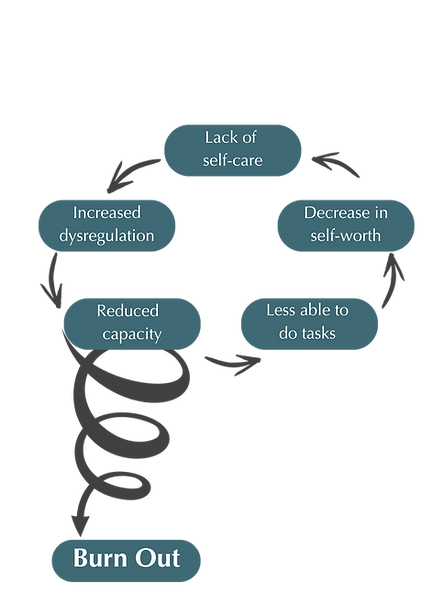
Neurodivergent Wellbeing

-
The less we looked after ourselves, the more dysregulated we would become.
-
The more dysregulated, the more energy we had to use processing the world around us.
-
More energy processing existing, meant less capacity to do things we wanted or needed to do.
-
Not getting things done, leads to negative self-talk and attempts to ‘just push through’, fuelled by blame and shame.
-
Negative self-talk tries to convince us that we are not deserving of self-care or the things that nourish us.
-
So we don’t look after ourselves because we haven’t ‘earned it’
-
And repeat….
I didn’t set out to create a model of neurodivergent wellbeing but, over time, somewhere between understand my own neurodivergent identity, my academic interested in identity and otherness and my work supporting ND clients and therapists, one emerged. Most importantly when I started sharing it with the people I was working to support, it resonated and became a helpful framework. This model underpins all of my work as a therapist, supervisor and trainer.
It started off with a pattern I noticed in myself as well as the people I was working with.

-
The more we look after ourselves (from basic needs like food and water up to meaningful connections, creativity and living in line with our values) the more regulated we become.
-
The more regulated we are the more capacity we have to spare for things beyond processing the world around us and managing our spikey profiles.
-
So we are able to do more of the things that matter to us.
-
This boosts our self-worth, so we find it easier to be kind to ourselves
-
And repeat…
As I spent more time reflecting on this and sharing it with clients and colleagues, it became apparent that it wasn’t just a cycle, but a spiral. The more times we went round the faster we would move through it and the harder it would be to break free of its pull. Eventually, at the bottom of the spiral, we reach burnout.
For myself, and in my work I became aware of the range of things that could hasten the descent down and the importance of recognising individual context when identifying these. Some of these downward factors are in our control, but many are not. (It’s a long running theme in my work that capitalism, patriarchy, ableism, etc are often key causes of distress.)
Being on the downwards spiral can feel like a helter-skelter, picking up speed and racing towards the bottom, with no way to stop yourself.
But I kept remembering the times when the opposite seemed to be true, when suddenly there would be an ease in my world and things would seem to improve at the same exponential rate. It was a client who challenged me to to find an equivalent upward spiral to represent this, and once I really started thinking about it, the answer became obvious.
We can’t increase our level of regulation or capacity by force of will. In fact this is one of the things that pushes us down, so place where we can exert influence is the place where many of us struggle the most: improving our self-worth and self-care.
As is nearly always the case, the answer is kindness and compassion. At the times when we are putting ourselves under the most pressure to ‘get things done’ are the times when it is necessary to stop and think about what we really need and how to attend to it with kindness and compassion.

Again, context is key. What is possible for each of us varies greatly, and an intersectional approach to understanding this is key, but finding the small kindnesses, the ones that allow us to weave compassion through our lives can help us to, at the very least, slow our descent, if not completely reverse it.
It’s about truly understanding out own brains and needs and finding ways to attend to them in order to move to a balance and sustainable life.
We are always navigating both of these spirals, existing in the tension they create between them, but if we are aware of what moves us up and down, if we give ourselves permission to make the choices that are right for us, then we can curate a life that works for us.
Work With Me
GET IN TOUCH
To see how I can help